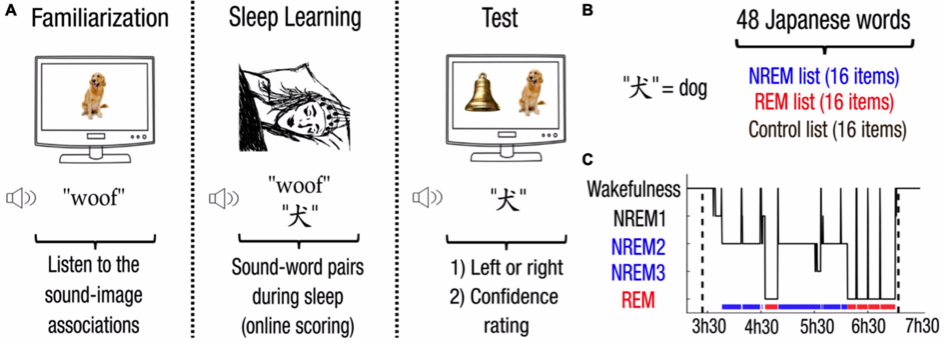
Can we learn Japanese while sleeping?
We already know that the sleeping brain is far from being totally cut off from the outside world, allowing us to wake up to the sound of our alarm clock. Does this ability to remain attentive to one's environment translate into learning new information that can be used even after waking up? And can this information be generalized to sensory modalities that were not solicited during sleep learning? Matthieu Koroma and Sid Kouider from the Laboratoire de Sciences Cognitives et Psycholinguistique, in collaboration with Maxime Elbaz and Damien Léger from the Center for Sleep and Vigilance at APHP-Hôtel Dieu, have investigated these questions. This research work was published on March 9, 2021 in the journal Frontiers in Neurosciences.
The researchers invited participants to come and spend a night at the laboratory. Equipped with an electroencephalogram, they fell asleep and associations between sounds and Japanese words were played during their sleep (for example a barking sound of a dog with the word inu, meaning dog). In the morning, the participants took a test when they woke up. The participants had to choose from two images which one they thought corresponded to the Japanese word (for example the image of a bell and a dog for inu), and determined the confidence they placed in their decision.

This experiment showed that new words can be learnt when played in NREM sleep. Nevertheless, the participants did not place more confidence in their correct answers compared to their errors, demonstrating that they were not aware of their learning. This type of learning, called implicit, is very different from the type of learning called explicit that is observed when being awake. The researchers carried out the same protocol in a control experiment and learning during wakefulness proved to be much more effective than during sleep (88% against 59% of performance with 10 times fewer repetitions). In addition, participants attributed more confidence to their correct answers than to their errors, showing that, this time, they were aware of the information learned.
The researchers also studied in more detail the brain responses associated with word presentation during sleep. They observed that slow oscillations were stronger in the frontal region in response to learned words compared to forgotten words, demonstrating that brain responses can predict learning success during sleep. Moreover, these brain signals changed during the night, reflecting the progress of learning during sleep. Slow waves are known to be characteristic markers of sleep and this work sheds new light on the contribution of this brain wave to memory processes during sleep.
So will we all be able to learn a foreign language while sleeping in the near future? The authors insist on the fact that sleep serves above all for the consolidation of the information learned during wakefulness, a phase during which learning is much more effective. Thus, a real complementarity exists between waking and sleeping, waking allowing to quickly acquire new knowledge in a conscious way and sleeping allowing to gradually integrate them into a larger network of knowledge in an unconscious way. This work nevertheless refines the distinction between these two types of process, demonstrating that it is still possible to learn complex information during sleep and to retain it to use it flexibly once awake. Does this type of learning depend on the phases of sleep? Do differences between individuals exist in such learning abilities? These questions remain open and give rise to new avenues of research to better understand learning processes during sleep.
Koroma Matthieu, Elbaz Maxime, Léger Damien, Kouider Sid (2022). Learning New Vocabulary Implicitly During Sleep Transfers With Cross-Modal Generalization Into Wakefulness. Frontiers in Neuroscience, 16, 10.3389/fnins.2022.801666
Contact: Matthieu Koroma - matthieu.koroma@gmail.com



